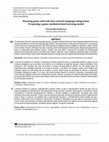Papers by Yuchan (Blanche) Gao
Early Childhood Research Quarterly

EuroAmerican Journal of Applied Linguistics and Languages
Content-based instruction, task-based language teaching, and game-mediated learning are three ped... more Content-based instruction, task-based language teaching, and game-mediated learning are three pedagogical approaches that are perceived as effective in second and foreign language education. These approaches share common ground in a sociocultural and functional view of language learning and popularity as engaging classroom strategies in elementary, middle, and high school (K-12) contexts. However, challenges may exist in ensuring content and language dual learning goals, designing language learning tasks, or implementing game-mediated activities. Therefore, this study seeks to describe the conceptual and methodological alignment among these approaches by reviewing recent research. Moreover, a game-mediated dual learning model is proposed to pinpoint a series of design components for language educators to consider when they integrate the aforementioned three approaches.
International Journal of Game-Based Learning
The game-mediated second and foreign language (GML2) field investigates how games can be used in ... more The game-mediated second and foreign language (GML2) field investigates how games can be used in facilitating L2 teaching and learning. This review explores how researchers define and differentiate among GML2 practices. A total of 51 publications from 2010 to 2021 were analyzed, revealing that only 40% of the publications defined GML2 practices, with the majority focused on the use of educational games. A key recommendation is that scholars clearly define specific types of GML2 practices in their empirical and conceptual work to build a more coherent body of scholarship.

International Journal of Game-Based Learning
Designing games from the ground up is a popular activity for helping students think in designerly... more Designing games from the ground up is a popular activity for helping students think in designerly ways. Despite their benefits, such game design activities may place higher-than-anticipated demands on cognitive and institutional resources. In an effort to alleviate these demands, this study explored how playing and fixing partially completed games may elicit engagement with designerly thinking. This paper reports on the results of examining participants' talk during a playfixing activity in which, rather than designing wholesale, participants mended incomplete or “broken” tabletop games. Results suggest participants focused on problem identification, demonstrated quick and sustained engagement with thinking like designers, and drew from designerly modes non-linearly. These results illustrate that broken games may hold potential as accessible alternatives for helping learners think in designerly ways.
Adult Literacy Education: The International Journal of Literacy, Language, and Numeracy











Uploads
Papers by Yuchan (Blanche) Gao